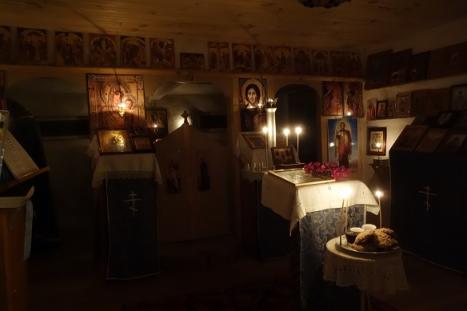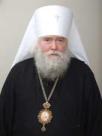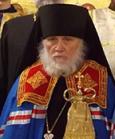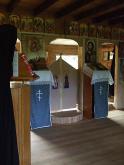Thursday, December 31, 2015
Announcement: Sydney parish feast - Services for St John of Kronstadt
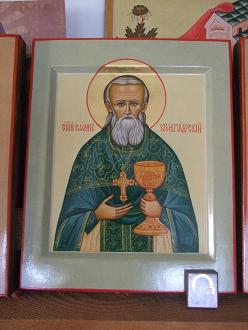
Sydney parish feast - Services for St John of Kronstadt
Престольный праздник в Сиднее в честь св. праведного Иоанна Кронштадтскаго.
The services for the Sydney parish feast of St John of Kronstadt and following Sunday will be as follows:
- Friday 19.12 (01.01, new style) at 5.00 pm - All-Night Vigil - St John of Kronstadt
- Saturday 20 12 (02.01, new style) at 8.30 am - Hours and Divine Liturgy - St John of Kronstadt
- Saturday 20.12 (02.01, new style) at 5.00 pm -All-Night Vigil - Sunday before Nativity
- Sunday 21.12 (03.01, new style) at 8.30 am - Hours and Divine Liturgy - Sunday before Nativity, Sunday of the Fathers, and St Peter, the Wonderworker of all Russia.
All are most welcome to attend!
РУСКА ПРАВОСЛАВНА ЗАГРАНИЧНА ЦРКВА
Епархија за Аустралију и Нови Зеланд,Црква“Свети Праведни Јован Кронштатски“Сиднеј,Аустралија
Приход в честь св. прав. Иоанна Кронштадтского
РПЦЗ в Сиднее (Австралия) приход в честь св. прав. Иоанна Кронштадтского.
Russian Orthodox Church Abroad
Russian Orthodox Church Abroad - Australian and New Zealand Diocese
Parish of the Holy Righteous John of Kronstadt
Address: 28 Macintyre Crescent, Ruse, NSW 2560 Sydney, Australia
Fr. Nebojsa Mirkovic
Telephone: 0413354913
Спаси Господи+
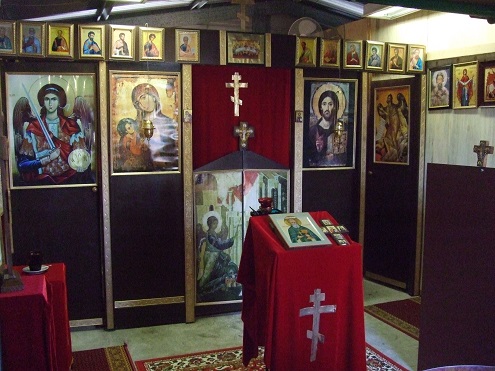
Sunday, November 15, 2015
Epistle from the Synod of Bishops
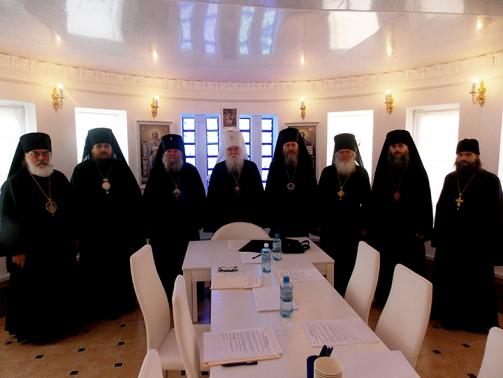
Epistle
of The Synod of Bishops of the Russian Orthodox Church Abroad
to the faithful children in the homeland and in the diaspora
Reverend hierarchs and pastors, monastics and lay people!
Having gathered in these days in the God-preserved city of Odessa, the members of the Synod of Bishops note that in most of our parishes, scattered around the world, spiritual life proceeds steadily and successfully. However, at the same time, in some areas of the territory of the Russian Federation, and partly in other places, a time of particular trial has arrived for our Church. In these few parishes, unfortunately, disturbance and mutual accusations have nearly become norm. “And whether one member suffer, all the members suffer with it” (1 Cor 12:26) - the Apostle writes. Therefore, pain in one area of our Church is passed on to Her entire body.
We all know that the unity of the Church is based on unity of faith and love between Her faithful children. At present we have a unity of faith, as witnessed by the signing of a Statement of Confession together with our sister Churches – the Greek, Bulgarian and Romanian. This is a confirmation of the right path along which our Church is proceeding, together with the representatives of other confessing Orthodox Churches for more than twenty years. This unity is a great value of which we must cherish. We must make every effort so as not to disturb it.
Today it is possible to confidently assert that the unity of confession of the Orthodox Faith unites us. There is no reason to reproach our Bishops of confessing some kind of heresy. Therefore we must speak about the fact that we are faced with a serious test of the strength of our brotherly love. Of course, it must be taken into account that the fratricidal war in the Ukraine largely furthers this. In a few cases it has changed brotherly love into hatred. Among our faithful children there also those who stand on opposite sides of this conflict. Sometimes this conflict sometimes is even directly transferred into the bosom of the Church. Lamentably, this becomes a cause of unjust and uncanonical division. But, “Is Christ divided?” (1 Cor 1:13). Is it possible that there exist values on earth that are worth more than unity in Christ? Physical war should not go transform into “spiritual battle” between Christians the same faith. Some of our brothers unfortunately forget this, being overly enthusiastic about political slogans.
Additionally, we constantly hear reproaches originating from the hurt pride of some of our former brothers. Likewise from those of our children who, while not fully comprehending the essence of the issues, attempt to defend those on whom the hierarchy has imposed fair interdicts. Those who have been rebuked, rather than changing their behaviour, have become hardened. Not only do they not make any effort or attempt to regularise their situation – instead they continue insulting and blaming the Bishops and brethren. In the words of the Apostle: “Let no corrupt communication proceed out of your mouth, but that which is good to the use of edifying, that it may minister grace unto the hearers.” (Eph 4:29). For this reason, the Synod of Bishops urges them to lay aside all their offensive statements with regards to the hierarchs, and to ask for their forgiveness. Otherwise, these statements will remain between us forever, like an insurmountable wall.
Not wanting to expose internal disputes to general spectacle, we have given the ruling Bishops the task to meet with the clergy for more detailed explanations where necessary. The clergy in turn will relate the opinion of the Synod to those parishioners who are interested.
Today we appeal to all the faithful children of the Russian Orthodox Church Abroad: Our Lord Jesus Christ constantly repeated: “Peace be with you.” These words are addressed also to all of us. Against the background of a general hostility and apostasy, which now has spread all over the earth, we must witness that we deserve to be called Christians – the disciples of the Divine Teacher. We must remember that we are the children of peace, not war. Remembering this, let us make every effort to maintain our unity.
Chairman of the Synod:
+ Metropolitan Agafangel
The members of the Synod:
+ Archbishop Andronik
+ Archbishop George
+ Bishop Athanasius
+ Bishop Gregory
+ Bishop Kyril
+ Bishop Nikon
Wednesday, November 4, 2015
St John of Kronstadt - Sydney parish feast
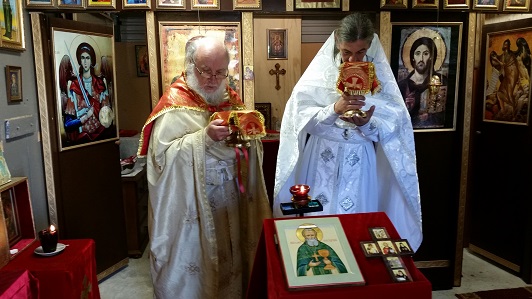
On Sunday, October 19/November 1, the Sydney parish of St John of Kronstadt (rector: father Nebojsa Mirkovic) celebrated its parish feast.
The Divine Liturgy was followed by the rite of the Slava and a moleben with procession around the church.
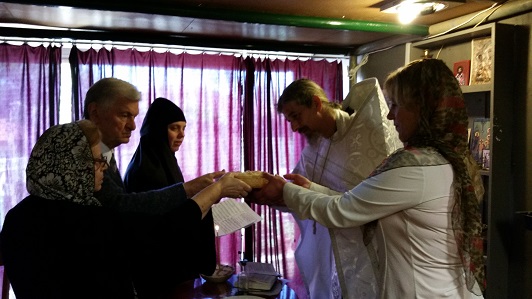
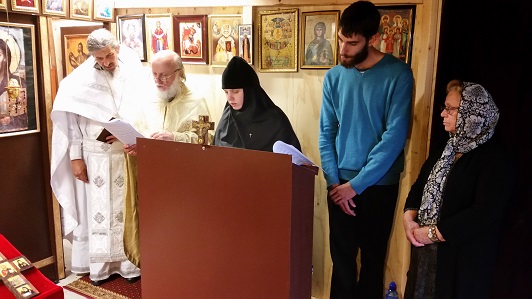
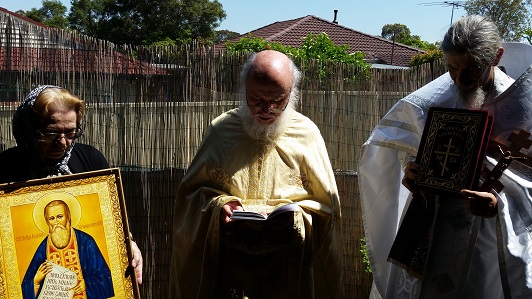
Wednesday, October 28, 2015
Sydney parish feast - Services for St John of Kronstadt

The services for the Sydney parish feast of St John of Kronstadt will be as follows:
Saturday 31.10 at 5 pm - All-Night Vigil
Sunday 1.11. at 830 am - Hours and Divine Liturgy
All are most welcome to attend!
Address: 28 Macintyre Crescent, Ruse, NSW 2560
Thursday, October 22, 2015
The Protection of the Mother of God - Melbourne Parish Feast
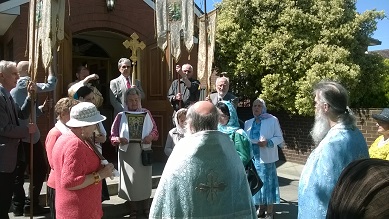
The Protection of the Mother of God parish in Melbourne celebrated its feast day on the Protection of the Mother of God, October 1/14. The rector of the parish, Igumen Andrei (Erastov), concelebrated with igumen John (Smelic). Despite the feast falling on a weekday, quite a few people were able to attend the services.
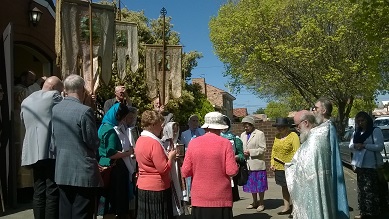
Thursday, October 15, 2015
Sermon by Archbishop Sofrony
….. Therefore, also we, my dear ones, every parish individually, and the entire universal Church taken as a whole is the Body of Christ. Together we are the Body of Christ – every individual parish reflects in itself every day, at every Liturgy, when the Priest performs the Divine Liturgy, every parish commemorates the incarnation of our Lord.
On the Altar Table, at every Liturgy, the Lord becomes flesh under the guise of bread and wine. His Body and Blood are offered to us. In each parish, the Lord is present, not partly, but in full. Every parish, with the Altar table at its head… We are all the Body of Christ – not individually, but all of us together.
The (parish) community is gathered together with one condition – that we have united together in order to inherit the Kingdom of Heaven, so that we would together enter the Kingdom of Heaven. This is our only goal in establishing communities, in establishing parishes. Our first responsibility – of every parishioner – is to become the Body of Christ, the Body of the Church of Christ. Therefore we all must be one – we should not each one separately work out our salvation – but rather all together.
This is what we come to Church for – so that we together can fulfill our main task – to inherit the Kingdom of Heaven. We do not come here for anything else. We do not come to expound on our relations, to explain what who thinks of whom. We come here because the parish – the Church – is the step to the Kingdom of Heaven. And we are all witnesses of this at every Liturgy, and we all answer “Amen” to the Priest’s exclamation: “Blessed is the Kingdom of the Father and Son…”
This is the beginning of the Kingdom of Heaven, here in the Church, my dear ones…not somewhere else…No other time but at Liturgy, nowhere but in the Church does the Kingdom of Heaven begin. It is the first step to the Kingdom of Heaven. And the first and foremost responsibility of the parish is for us together to inherit the Kingdom of Heaven, so that we would together enter the Kingdom of Heaven.
But we often forget this responsibility of ours, and each parish often becomes some sort of external structure, some sort of organisation. And people come to the services, to the parish and it is as if they do not feel that they participate in the Liturgy, in what is happening on the Altar Table.
My dear ones, without your faith, without your love - the Lord cannot save us. For if we have love, if we have faith – only then can the Lord enter our hearts. Yet what is our hearts not occupied with during the Liturgy? What thoughts and what justifications is it not occupied with, instead of the main purpose that is happening at the Liturgy. The main thing that happens is that the Lord is present amongst us. The Lord, the Living God, present on the Altar, looks at our soul and looks at heart, at what it is occupied with.
Therefore, my dear ones, while we live in the vain, sinful world, do not forget what we come together for, why we establish parishes, what we live here on earth for. Remember that each parish individually, all of us together, are the Body of Christ.
We are members of Christ – but look at how we sometimes behave! How unfriendly we are, and how we have some sort of thoughts against our neighbour, against someone. Remember that this person also desires salvation, that for him as well the Lord was crucified on the Cross. Remember that also for this person, who we do not like at this moment, or who does something incorrect in relation to us – remember that for him also Blood was shed…
When we come to Church, we should wholly adore the Eucharist, adore the Lord – and come to Church for Him. We should come to Church and forget about the entire world that exists around us, forget about all the unfairness and all evil that affects us. We should fall on our knees before the Lord and beg for forgiveness and because of our sins, beg because of those offenses which we cause one another.
Remember that we must not come to Church mechanically, because we of habit – we are used to it, we come, and … we should come consciously. The Lord was not crucified on the Cross mechanically – it was not something that just happened – He was crucified because he adored us, because He loved His creation.
But do we adore Christ? Do we love Him? Is He the most important for us in the world? Or is something else? No – often what is most important for us, is what others think of us, or what others say about us – for us that is the main thing.
No, my dear ones – remember that the Lord shed His Blood for us on the Cross – for us all, equally. He loves everyone equally, and everyone is dear to Him. Even bad people are dear to Him, and even good people are evil before Him.
But remember, dear ones, when we come to Church – leave all your maliciousness and all your craftiness outside the walls of the Church, and come with a clean heart, just once a week, to the Church – come to the Living God. The God Who sits on the Throne (Altar), the God Who is given to you on the spoon from the Chalice – the Living God! Come to Him with your mind and heart. Look what exists in our heart, what is hidden in the heart – every sort of falsehood and every kind of obscenity.
My dear ones, remember what we live on earth for. Father Wsewolod, whom we commemorate today, called us to …. only this, he called and taught us to live in the Church, to be with Christ, to be with the Living God. When we commemorate our fathers and relatives who have departed before us, let us remember their teaching – do not only remember, but fulfil it is your lives. “By this shall all men know that ye are my disciples”, says the Lord, “if ye have love one to another”. If we will have the Love of Christ amongst ourselves, in our behaviour, we will be preaching the Risen, Living God.
But if we, by our behaviour, preach disputes, problems, or anything else that is against God, then we will not at all be preaching of God, but rather, we will be preaching of our passion, of the creations of the devil. It is him that teaches us, and teaches us how to be evil to each other. It is him that has us discover all sorts of evil in another person.
But rather, my dear ones, try to see in that very person, what is most good, most decent, most enlightened. And in that moment, in which that person perhaps has a bad attitude to us, try to see in that very person the most pure, the best in him – his soul, his intention to be saved, his love for God. Do not try straight away to see anything bad in a person – rather, see only what is good, what is pure. And then your guardian angel will open your eyes and disclose to you the person seen from the other point of view – the Gospel understanding. What did the Lord come to earth for? So that we would see each other through the Gospel – through the commandments of God.
After all, we do not see ourselves through the commandments. We forgive ourselves many kinds of deeds, but we do not forgive our neighbour.
My dear ones, let us look at each other through the Gospel, let us rouse ourselves to the love of God. Let us adore the services, the Liturgies – let us worship the presence of God amongst us. For whether we want it or not, the Lord is present in the Church, because He ordained it so, saying: “I will build my church; and the gates of hell shall not prevail against it.” His Church – that is us. It is not the walls, it is us, the souls. We are the Body of Christ. Therefore, let us conduct ourselves in a way worthy of the members of Christ. Let less be heard about any kind of disputes taking place amongst us. Let us forget about all disappointments when we come to God. And then the Lord will forget His displeasure in relation to our sins. If we learn to forgive and not notice what is said to us, then God will also forgive our sins. And then God will not turn His attention to our falsehoods.
My dear ones, I call you again to remember that we – the parish, the Church – are the Body of Christ. We have not gathered here for anything else, but to inherit the Kingdom of Heaven together. Therefore, my dear ones, hold every Liturgy dear, whenever it is served, by whomever it is served, and wherever it is served. Remember that on the Altar and in the Chalice God is present. On the spoon, the Body of the Living God is given to us. This is not just some ritual, not some mechanical act, but rather, the Body of the Living God. Think about that, and with fear of God and faith draw nigh to the Body and Blood of Christ. Amen.
Feast day of Saint Hariton
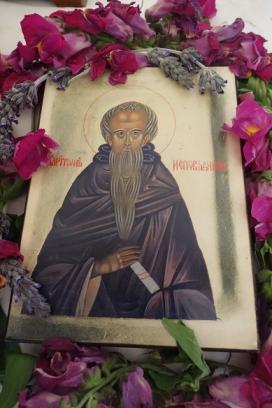 On Sunday the 28.9/11.10, the feast day of Saint Hariton was celebrated by pilgrims and monastics at the Annunciation Hermitage.
On Sunday the 28.9/11.10, the feast day of Saint Hariton was celebrated by pilgrims and monastics at the Annunciation Hermitage.
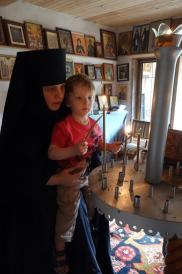
Saint Hariton the Confessor offers us an example of faith in God in unexpected and perhaps challenging moments in our lives. Whatever happens to a Christian is from God and is exactly what is needed for his personal salvation.
Read a life of the venerable confessor here.
Monday, September 28, 2015
Exaltation of the Cross - Camp
From September 25-27, a group of young people came to the Annunciation Hermitage for a camp.
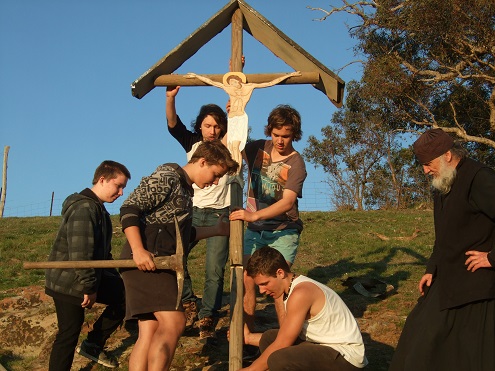
They made and erected a Cross on “Mount Tabor” above the monastery.

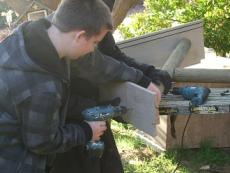 Carpentry skills by the boys were put to good use. Some of the boys helped with the iconography, whilst the rest had the difficult task of digging a deep hole in the rocky ground. The tropar and other hymns to the Cross were sung.
Carpentry skills by the boys were put to good use. Some of the boys helped with the iconography, whilst the rest had the difficult task of digging a deep hole in the rocky ground. The tropar and other hymns to the Cross were sung.
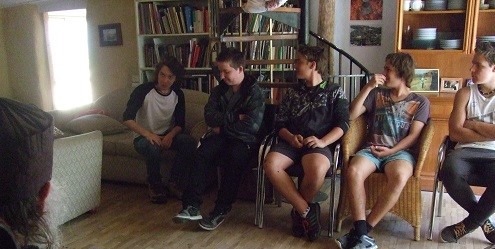
The participants had five lectures and discussions on the Law of God.
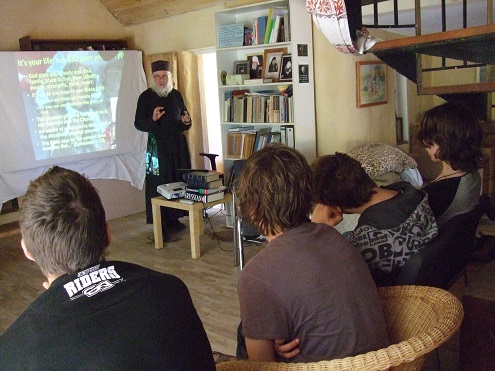
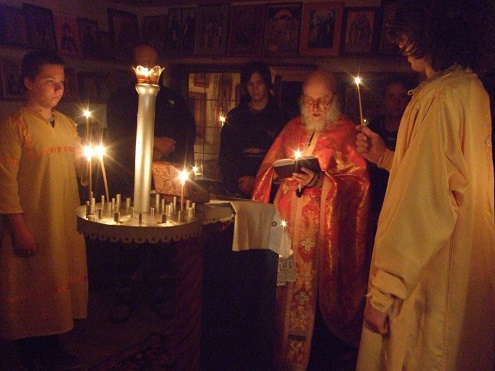
They prayed at the services morning and evening, and took part of Holy Communion.
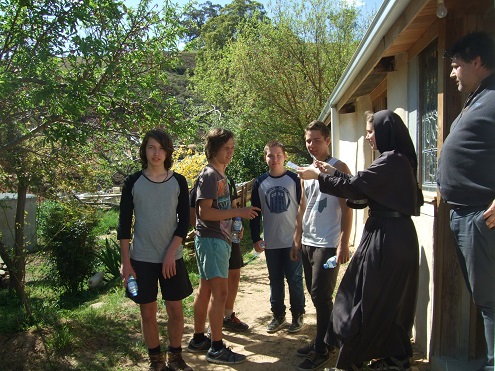
 A competition - the teams were handed the first question, which started them off on a search for ongoing clues hidden all over the monastery property. Competing team members share experiences on the challenges of the competition track - quick decisions had to be made during the race.
A competition - the teams were handed the first question, which started them off on a search for ongoing clues hidden all over the monastery property. Competing team members share experiences on the challenges of the competition track - quick decisions had to be made during the race.
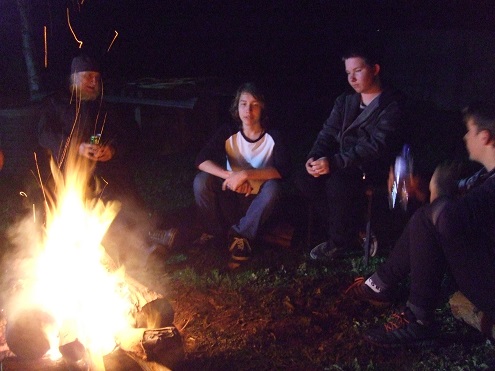
A campfire with discussions about ancient Rome, the first Christians, and tall tales.
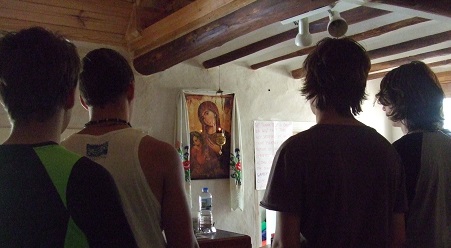
Tuesday, September 8, 2015
Abbess Alexandra: On Christian love (conference report)
Love is the only thing that can not be demanded. You can cry when it is not present, and rejoice when it is. People are mistaken when they demand love.
Saint John of Shanghai
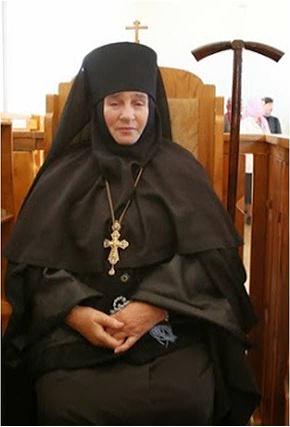 Speaking of Christian love, let us first of all turn to St. Ignatius Brianchaninov, in whose works we find all the priceless teachings the Fathers have left us, who theoretically and and by experience internalised the Gospel teaching.
Speaking of Christian love, let us first of all turn to St. Ignatius Brianchaninov, in whose works we find all the priceless teachings the Fathers have left us, who theoretically and and by experience internalised the Gospel teaching.
He writes:
We know from the Fathers that there are two kinds of love for neighbour: the natural and the evangelical, which is love in Christ. Natural love has been planted in us at creation, and therefore it is certainly present in every human being. It has been damaged, just like the other good human properties, by the fall, or the ancestral sin. Therefore, each person is subject to more or less damage, short or long-lasting changes. Christ heals all our diseases in a marvelous way, also heals our damaged love: He commands people to love Himself - the Lord - in a man. This brings love up to the highest degree of fervour, gives it purity, spirituality, a sanctuary. Likewise, the flame of love in Christ extinguishes the discordant, smoky flame of carnal love - which consists of a mixture of dreamy, non-existent delight and brutal, murderous torment. The feeling of spiritual love guided the pen of St. John of the Ladder, when he said: “Love of God extinguishes our love for our parents. And so he who says that he has both deceives himself.” He also said: “he is pure who expels fleshly love with divine love, who has extinguished the fire of passion by the fire of heaven (i.e. the Holy Spirit)” When we look at ourselves with attention we will see, with God’s help (God’s help is needed for such a vision! This vision is the gift of God!), that we mostly have a natural love, and have yet to acquire the evangelical love [1].
Give homage to your neighbour as to the image of God - a respect within your soul, which is invisible to others, which is clear only to your conscience. Let your activity be mysteriously conformable to your state of mind.
Give homage to your neighbour, without distinction to age, gender, class - and gradually holy love will be revealed in your heart.
The reason for this holy love is not flesh and blood, not the drive of the senses - but God.
Give homage both to the blind and the leper, and the one with a mental disorder, to infants, and criminals, and pagans show reverence as to the image of God. What are their weaknesses and shortcomings to you! Watch yourself, that you do fall short in love.
In a christian, give reverence to Christ, Who said in His instructions, and also will say when our eternal fate is pronounced: “Inasmuch as ye have done it unto one of the least of these my brethren, ye have done it unto me.” (Matt. 25.40).
In your relation to your fellow man, keep in mind this saying of the Gospel, and you will be made a confidant of love for neighbor.
The confidant of love of neighbor enters into the love of God by it.
But if you think that you love God, and in your heart there lives an unpleasant attitude to even one person, then you are in grievous self-delusion.
St John the Evangelist says: “If a man say, I love God, and hateth his brother, he is a liar…this commandment have we from him, That he who loveth God love his brother also.[2]
The Gospel rejects the love that depends on the movement of blood from the feelings of the carnal heart. The fall subjected the heart to the dominion of blood, and by blood, to the sovereignty of the prince of this world. The Gospel frees the heart from this bondage, from this violence, and leads it to the guidance of the Holy Spirit.
The Holy Spirit teaches us to love our neighbor in holiness. Love which is lit and fueled by the Holy Spirit is a fire. This fire extinguishes the fire of natural, carnal love, which is damaged by the Fall.
What a fallen state our nature is in! He who by nature is capable of vehemently loving his neighbour, has to force himself extraordinarily to love his neighbour in the way commanded by the Gospel. The flame of natural love easily turns into disgust, into an implacable hatred.
How plagued our natural love is! What a grievous wound to her is passion! Possessed by passion, the heart is capable of any injustice, any iniquity, just to satisfy its morbid love. Natural love gives his favourite only what is earthly, for it does not think of heaven. It rebels against heaven and the Holy Spirit, because the Spirit calls for the crucifixion of the flesh. It rebels against heaven and the Holy Spirit, because it is under the control of an evil spirit, the unclean spirit of one perishing.[3][/quote]
For every Christian (and especially for monastics) it is very important to understand what passion is and how it differs from love in Christ. I will bring your attention to a conversation of Bishop Photios of Triaditza with monastics on this topic.
“Often we confuse love with passion, passion for man … In fact, it is not the person it is difficult to leave, abandoning him himself. We could leave him to God, but it is difficult for us to deny ourselves, deny our own desire for a person, our attraction to the person. This is passion.
Passion is a manifestation of our self-love. It is very dangerous and extremely harmful to the spiritual life. Love is pure and disinterested; passion is something quite different. Passion is a morbid fascination, the soul cleaving to a specific person. This is constant thoughts of him, how he sees me; a special excitement and satisfaction, an agreeableness, when that person pays attention to us; and vice versa - unsettledness, depression, moodiness when that person does not have a friendly attitude to us or does not behave as we would like. In all this - God forbid - it is possible to go to the lowest depths. I do not wish to speak about this. We should wage an uncompromising struggle with these things, even fighting unto blood. Otherwise, self-love will remain the guiding principle in our lives, in our existence. The Lord tells us that it is impossible to serve two masters - this we know.
I think that we are afraid; the voice of our self-love does not give us trust in the Lord until the end, trust in the truth that the life of the soul can be purchased in its entirety only in the communion with God. Yes, we do not have any similar experience; we are sinful, unclean creatures. As she moves away from God, the soul is hungry, poor, wandering the world like a stranger, rejected by all. And then the soul begins to become attached to one soul, or the other. This is obviously a terrible self-deception, a serious illness. The soul is trying to find in another soul some kind of a world, in which to find satisfaction, pleasure for her selfishness. Here we must be uncompromising, strict to the end, otherwise we will remain in captivity to our selfishness.
If someone seems nice to you and your heart is drawn towards him, it does not mean that you love him. If this enthusiasm continues, you yourself will soon learn what treacherous, even tyrannical claims your soul presents with respect to this “dear” man. You will see how your soul can not stand that man’s independence from you, she is jealous and demands love for herself, demands that the subject of your love be slavishly devoted to you.
And your soul is ready to retaliate if this affection grows cold! We see that in this case everything rests on self-love, on the expansion of one’s own possessions in this world: “What I like - this is mine. It is in some way belongs to me.” For the most part this “cute” man is a door to a new, interesting and enjoyable small world trust for your heart. At the beginning you just want to enjoy this world as a little garden, and then you wish to put a small house there. When you are strolling through the garden, you no longer admire what is planted in it, but rather, yourself. This is the most disgusting of partiality in false love. Therefore, I repeat that here we really have to be uncompromising.
“True Love - says Saint Paul - seeketh not her own” (1 Cor. 13:5). Pure love is unselfish. It is generally quite alien to be possessive of what you love, because it is love in the Lord. Love in the Lord always respects the freedom of the other, and always loves man in Christ. It is difficult to understand this for us, because we are not committed, there is no trust and openness to the Lord, in order to make an effort in this direction. When a man fights, when he knocks, the Lord eventually opens. And then all these truths become clear to the mind, she knows them in her inner experience. Then the soul rejoices, because the truth has become her own private treasure. She rejoices because in her quest, in her struggle against all that separates her from the Lord, she is seeing a stronger stream of light in the tunnel; She rejoices because this brings her to God, and this joy is natural from her perspective - yet it is supernatural in terms of our fallen state.”
Abbess Alexandra
[1] Meeting of the letters of St. Ignatius, Bishop of the Caucasus. Publication Research Center, the protection and restoration of the heritage of the priest Paul Florensky. M., 1993. p. 153
[2] St. Ignatius (Bryanchaninov). Ascetic experience. T. 1. M., “Rule of Faith”, 1993, p. 125-126
[3] St. Ignatius (Bryanchaninov). Ascetic experience. T. 1. M., “Rule of Faith”, 1993, p. 121-122
Saturday, August 29, 2015
Some thoughts on Church reality (Conference paper)

All these years, after entering the Russian Orthodox Church Abroad, I both voluntarily and involuntarily observe the events of the religious life of the former Soviet Union. Of course, the reality is such that we can state: The religious organization of the Moscow Patriarchate has rejected the possibility of repentance. The “system”, has been able to repeatedly change its “colour” to adjust to the new political reality, like a chameleon. But this is not surprising, as this organization ever since 1927 lives on the basis of a demonic delusion which is called the Sergianist heresy. By its illness and leprosy of non-repentance, this “organization” has infected and continues to infect a great many people. This has become especially tangible in the present “pro-Putinist” period of modern political reality. At this time, it has became clear that, alas, there has been no true repentance of the people with respect to the bloody, atheistic Soviet past. Saint Philaret Voznesensky wrote:
One remembers father Archimandrite Konstantin (Zaitsev), who spoke much, and persistently, about that the worst of what has been done in Russia by the atheistic power, is the creation of the “soviet church“. The Bolsheviks presented it to the people as the true Church, having driven the Orthodox Church into the catacombs and concentration camps.
(On the Relation of the ROCOR to the Moscow Patriarchate Filaret St Voznesenskiy.http: //catacomb.org.ua/modules.php? Name = Pages & go = print_page & pid = 1335).
But let us come closer to the subject. For an Orthodox Christian, the moral ideal is the Lord Jesus Christ, who calls every sincere believer in Him:
“… Take my yoke upon you, and learn of me; for I am meek and lowly in heart: and ye shall find rest unto your souls.” (Matt 11:29).
This is, so to say the “psychological portrait” which true Orthodox Christians should seek to acquire. Because a Christian knows the teaching of the Church about the likeness of God, and how a person can direct his abilities and strength of soul towards God-likeness - towards perfection in pursuing truth and goodness.
 However, when the kind of behaviour described above becomes routine even for crowds of people, having been excited by “priests”, all in the name and outward appearance of Orthodox Christians and the Orthodox Church, and even after “prayers” - one becomes frightened and sad. For all of this has no relation neither to the Church nor to God. Rather, it more closely resembles an organization showing the characteristics of a destructive cult. Truly:
However, when the kind of behaviour described above becomes routine even for crowds of people, having been excited by “priests”, all in the name and outward appearance of Orthodox Christians and the Orthodox Church, and even after “prayers” - one becomes frightened and sad. For all of this has no relation neither to the Church nor to God. Rather, it more closely resembles an organization showing the characteristics of a destructive cult. Truly:
Beware of false prophets, which come to you in sheep’s clothing, but inwardly they are ravening wolves. Ye shall know them by their fruits…
(Matt 7:15-16).
Now, let us note that the process of “deterioration” from a church schism to transforming into a sect can be very long. However, the logic of this process is approximately as follows: Any schism which is not being healed by repentance sooner or later turns into a heresy, and then is transformed into a sect. Of course, one does not want to use this term for the religious organization of the MP by any means. But, alas, the life and the fruits of this “system” unwillingly put one on ones guard..…
For the Orthodox person who knows the true recent history of the Russian Church, who closely observes what is happening today, this is obvious. The process of “deterioration” in this organization has already been crowned, so to speak, by her Sergianist heresy as well as the heresy of ecumenism. It has given birth to a characteristic pseudo-spirituality: False eldership, the concept of the “infallibility” of the top hierarchy instilled into the minds of followers. In other words, an obvious effort to bring up loyal, obedient, servile , unthinking, and equally passionate members of the organization. Candidates are ordained to the priesthood indiscriminately. There is a purposeful and planned transmission to the flock of reinterpreted, false data on the modern history of the Russian Orthodox Church and the state. This is the cult of profit, double standards, corruption, an avalanche of every possible false teaching of an apocalyptic nature; the cult of politically-motivated canonizations; the general exploitation of the people under carefully hidden political, religious, cultural, and other guises - for favors to, or by order of the authorities.
Well, what if a person is conscientious, thoughtful and sensitive to the truth of Christ, and does not get caught in the psychological traps? In that case, fierce persecution, slander, and even physical violence are guaranteed by the “ system.” Incidentally, this is also a sure sign of a destructive cult.
“St. Theophan the Recluse, (writes Archimandrite Constantine) predicted the last stage of apostasy in the Church: The external semblance of the Church, devoid of grace, with only her deceptively seductive, visible image. The whole atmosphere of apostasy is that nutritious broth in which all the germs of antichrist grow. Eventually it will grow the two-faced image of Antichrist himself, who will simultaneously show himself as a militant fighter for Christ, while at the same time also vested in the deceptive appearance of a betrayer of Christ.
The last words, in my view, exemplify well the religious character of the MP organization and its pseudo-spiritual experience.
The “system of the Patriarchate” has managed to take on the role of an ideological “guide” in the post-Soviet state, all the while itself being a product of the totalitarian Bolshevik power. This has naturally given birth to chauvinism instead of true repentance, to a hybrid Soviet - Orthodox Russian national socialism, and to an aggressive “orthodox Taliban”. This occurs in the post-Soviet society, which is not able to see the difference between ideology and true, sincere faith in Christ. However, this situation and condition is the fruit of pride, self-delusion and lack of repentance. That is why it is desirable for a person who has become aware of the falsehood of the “system” of the MP to leave immediately, without deceiving himself with the false idea of the struggle from within. To remain in a religious organization founded on lies, bears serious danger to the spiritual and mental health of the individual. It endangers the salvation of the soul and the hope of a blessed eternal future.
Therefore, a conscious shift to the ROCA, joining the Church of Christ, is a courageous step. It is often associated with a profound mental and psychological shock. This is not surprising, as the act of giving credence to lies as if to truth, living for many years in such a state, inflicts wounds upon the soul. This has brought an experience that we must critically review with penitential prayer to the Lord and with the help of an experienced spiritual guide, now on the basis of Holy Tradition of the Church of Christ.
But in any case this negative experience should be taken as a lesson given by God in discerning good and evil. It is important not to lose heart, not to accept ungrounded fears, confusion and anxiety, doubts, all of which the enemy of our salvation may inspire. There is a weapon against all this: Confession and counsel with the bishop or an experienced priest. In this difficult time it is necessary to patiently learn not to fear persecution, intimidation, defamation from “misguided” brothers. It is very important in this difficult period not to become embittered against ones persecutors, to endure all for the sake of Christ.
There are a number of priests, monastics and laity of our Church who are people come from the MP. Therefore some issues emerge both in spiritual and parish life. Even after several years, people can carry an “imprint” of their stay in the Patriarchate. We have to always remember these and other hazards, and be watchful. For example, some priests that have come from the MP are drawn just like “magnets”, not to the teaching of Christ, but rather to delusional ideas and false teachings of patriarchate false elders, or the surrogates of various clever people of an apocalyptic character. The organisation of the MP is a real “muddy spring”. Take a gulp from this “source” and you become infected - then trouble follows: For the soul, for the parish, and for our Church - and a headache for the bishop. Therefore the above outlined guidelines, thoughts and cautions are not dry theory, but the living experience of people who have gone through this themselves.
Some may reproach me for this presentation: “Again you’re speaking about the patriarchate …” Therefore, I will finish it by drawing attention to the life of our Church. We all think of ourselves as church people, faithful children of the Russan Orthodox Church Abroad. But do we know what this means for us? Venerable father Justin Popovich taught that the Church is the God-man Jesus Christ. Therefore hieromonk Seraphim (Rose) accurately notes:
“The whole point of the Church is to attain Christ in ones heart. But a person can live all his life associated with the Orthodox Church, and yet have with a heart not awakened.”
So, if we consider ourselves to be church people, we must comprehend with the mind and heart, that the Church makes us partakers of the same nature as Christ, and sets before us the goal of our Christian Church life , which is briefly summarized by apostle Peter in his epistle:
“…that…ye might be partakers of the divine nature… “(2 Peter.1: 3-4).
And if we are the children of Christ, we are called to DEIFICATION [Tr. note: Becoming God-like]. Then how can it be that we have amongst us gossip, feuds, disputes, grievances, misunderstanding of Church catholicity - voluntarily or involuntarily misidentifying it with democracy and anarchy - slander and anger? How is it possible that we, instead of doing the work of penitential prayer, turn all our private Christian life and the church into an arena of verbal battles and politics? Is it not clear that this is the explicit fruit of the devil:
“… A good tree cannot bring forth evil fruit, neither can a corrupt tree bring forth good fruit. Every tree that bringeth not forth good fruit is hewn down, and cast into the fire…” (Mt 7:16-20).
Do we really love our little Russian Orthodox Church Abroad so poorly that we are not afraid to lose the gift of God - the Church, and thus our salvation!
Archbishop Averky (Taushev) wrote:
“True Christianity is not only a formal recognition, the cold acceptance of the mind of a a certain sum of abstract dogmatic positions - rather, it is spirit and life. In true Orthodoxy - faith and a life in faith, or piety, are inseparable. The great father of the Church, saint Cyril of Jerusalem speaks eloquently about this: “The image of piety consists of two things: of pious dogmas and good works. Dogmas without good works are not pleasing to God, and works performed without pious dogmas will not be accepted by God. What good is to know the tenets of God, yet in folly to commit fornication?“ (Cathecatical Homily IV).[/quote] That is why both the ancient Fathers of the Church, and our Russian fathers (see for example St. Tikhon of Zadonsk and St. Theophan the Recluse), clearly teach that the true Orthodox person is not the one who simply accepts the tenets of Holy Orthodoxy with a cold mind, but rather, the one “who thinks Orthodox, feels Orthodox and lives Orthodox.”
(On the Importance of Episcopal Rank and the Council of Bishops. Archbishop Averky 1956 to the Synod of Bishops).
In the Gospel of St. Matthew we read:
“… what is a man profited, if he shall gain the whole world, and lose his own soul? or what shall a man give in exchange for his soul? For the Son of man shall come in the glory of his Father with his angels; and then he shall reward every man according to his works.“ (Matt 16:26-27).
Therefore, in my opinion, we require consciousness of our sins, knowledge from experience of ones weakness and unworthiness, contrition, humility - from these are born the desire and effort to transform ones private spiritual life to prayerful repentance according to the Commandments of God, the teachings of the Holy Church and the Holy Fathers. Above all this is what is necessary for the transformation of both ones private life, and even more so, church life generally.
After all, prayer is the mother of all virtues, and it is necessary to internalise this. I conclude with the words of the Apostle Peter, which are directed to all Christians, regardless of rank and title, to each one of us:
“…add to your faith virtue; and to virtue knowledge; And to knowledge temperance; and to temperance patience; and to patience godliness; And to godliness brotherly kindness; and to brotherly kindness charity…For so an entrance shall be ministered unto you abundantly into the everlasting kingdom of our Lord and Saviour Jesus Christ.
(2 Pet 1:5-11).
July 2015.
+ Archbishop George (Kravchenko)
